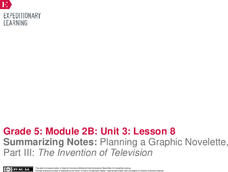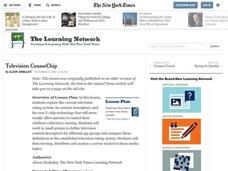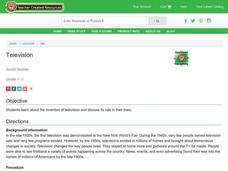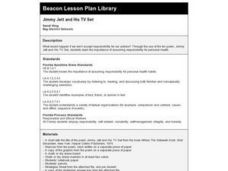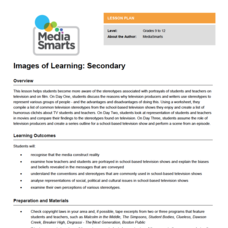Media Smarts
Taking Charge of TV Violence
Encourage your class to become aware of the violence that is present in children's television programs and how this violence can influence children. Do this by holding the planned class discussion in this lesson plan and providing...
Curated OER
Is TV Stronger Than Ever, or Becoming Obsolete?
The New York Times offers of two articles and two summaries for learners to consider. They read each article and then post a blog response to each of the seven related questions. The topic of the articles asks the question; Is TV...
Media Smarts
Violence on Television
Focus on a specific incident of violence on television in the case of the Canadian Broadcast System showing Silence of the Lambs on public television. Look at the broadcasting codes and a complaint that was filed against the Association....
Curated OER
Television Newscasts
When we watch news broadcasts on television, we receive a much more visual perspective than when we read the newspaper. How do sets, clothing, and music contribute to our understanding of the story? Compare American and Canadian news...
EngageNY
Summarizing Notes: Planning a Graphic Novelette, Part III: The Invention of Television
How did the television change people's lives? Learners consider the question as they complete their storyboards about the invention of the TV, adding visual elements along the way. Then, they participate in a peer review to offer and...
Curated OER
Turn Off the TV?
Classroom ideas that provide opportunities for pupils to explore alternative leisure activities during National TV-Turnoff Week.
EngageNY
Summarizing Notes: Planning a Graphic Novelette, Part II: The Invention of Television
Let's work together! Using the collaborative resource, scholars work in triads to begin section two of their storyboards about Philo Farnsworth, the inventor of the television. They then practice using linking words and phrases to...
Curated OER
Turn Off That TV!
To honor Screen Free Week, how can you challenge your class to turn off the TV May 5-11, 2014?
Curated OER
Television CensorChip
Explore the current television rating system, its content descriptors, and the new V-chip technology that more readily allow parents to control their child's television viewing. Help learners develop a survey that will determine the pros...
Curated OER
Understanding: Television
Students discuss their experiences with television. They break into small groups and go through the steps of producing a television show themselves. Their presentations are made to the entire class.
Media Smarts
Teaching TV: Television Techniques
As part of a five-lesson unit on how television uses technology and film techniques to communicate meaning, elementary students create their own media productions that demonstrate their understanding of these concepts.
Media Smarts
Thinking About Television and Movies
As part of their study of the influence of TV and films, class members consider how music, lighting, costumes, camera angles, etc. are used to influence the response of viewers.
Media Smarts
TV Dads: Immature and Irresponsible?
Examine gender stereotypes on television, focusing on fathers portrayed in sitcoms and advertising. Questions on a handout direct learners to consider the types of fathers they see on television and one advertisement is highlighted as...
Curated OER
Art Reflecting Life
Have your young television viewers discuss popular shows among their peers. After choosing one show to analyze, middle and high schoolers read about the 2007-2008 network television lineup with the New York Times article "Gauging...
EngageNY
Using Quotes to Explain: Why Philo Farnsworth Invented Television
Television or radio? Scholars read pages 18-28 of The Boy Who Invented TV: The Story of Philo Farnsworth to discover why Farnsworth thought TV was better than radio. They determine the gist of the section and then look closer...
EngageNY
Building Background Knowledge: The Boy Who Invented TV, “Life before Philo”
Walk through the pictures to understand the text. Scholars analyze The Boy Who Invented TV: The Story of
Philo Farnsworth by taking a book walk and looking at the pictures. They then do a first read of Life before Philo to...
EngageNY
Using Quotes to Explain Relationships: How the Invention of Television Changed People’s Lives
Television changes the world. Scholars determine the gist of the video clip Television Takes the World by Storm and article How Do
Inventions Affect the Way We Live? They then do a second view and read to complete an Explanation Task...
Curated OER
Television
Students investigate the invention of television and examine its role in their lives. They read and discuss an informational handout, list the pros and cons of television on a worksheet, and create a class pie graph illustrating the...
Curated OER
Television Goes Digital
Students explore the difference between analog and digital televisions. They examine how the technology works and the impact of television through history. They also compare older television sets to ones found today.
Curated OER
"The New Television Set" a Gateway to the Post World War II Era
Eleventh graders demonstrate their knowledge of the effects of television on the political, economic, religious, social, intellectual and artistic life of the US nation from the 1950's. Research how television shaped public opinion with...
Curated OER
TV Tells it All
Students discuss the concept of gender bias and stereotyping. In this social science activity, students determine what the influence of television on gender roles represents and compares the chage in gender roles of today to those of...
Curated OER
Jimmy Jett and His TV Set
Fourth graders engage withh the fun poem, Jimmy Jett and His TV, to explain the iimportance of assuming responsibility for personal health.
Media Smarts
Images of Learning: Secondary
Make your scholars more aware of stereotypical portrayals in film and television. Discuss the definition of "stereotypes" and how they are used to present a story. High schoolers look at specific television shows and complete a chart...
Mathematics Assessment Project
Jane's TV
Jane wants a new television, but she's not sure what size to buy! Your middle schoolers can figure it out when they apply the Pythagorean theorem. Produced especially for meeting Common Core standards in geometry, this activity appeals...
Other popular searches
- Educational Television
- Television Cartoons
- Evaluating Television Content
- Crime Drama Television
- Images on Television
- Television and Film
- Television Broadcasting
- Television Commercials
- Westerns Movies Television
- History of Television
- Film and Television Production
- Pop Music on Television






